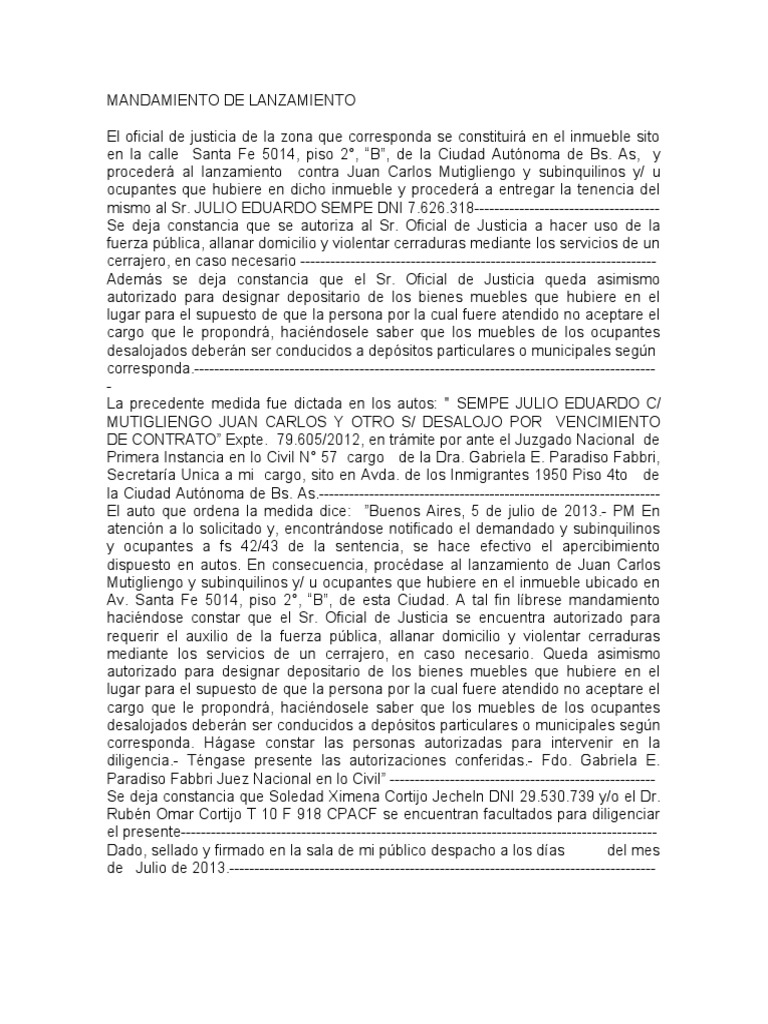Feminine noun. In Legal Spanish acción is the right to go to a judge or court seeking the protection of a right or an interest. A demanda is an acción judicial and the verb is accionar. The person is the actor or demandante (claimant) and the party that has been sued is called demandado.
In Business Spanish, acción is the title that represents an aliquot part in the capital of company and that gives the right to a proportional part in the distribution of benefits and to the corresponding patrimonial quota in the dissolution of the company. It is what in English is called a share. And a shareholder is an accionista. If we are speaking about shares of a SRL, we call them participaciones, and the shareholders are called socios. dc
La palabra del día: Mandamiento
Masculine noun, from mandar, to command.
In Legal Spanish, a mandamiento is the document in which a judicial order is written to be sent to whom it may concern. It is not the order itself but the document or the piece of paper where that order is written to be enforced.
For example, a judge, in a sentence, orders an eviction (un lanzamiento), then:
1. The lawyer of the interested party writes the mandamiento to be sent to the person who is meant to be evicted and quotes the part of the sentence where the eviction is ordered.
2. The same lawyer leaves the mandamiento in the reception area of the court to be checked and signed by the court secretary, not the judge, because the secretary is also a notary.
3. Once the mandamiento is checked and signed, the lawyer collects it and takes it to the Oficina de Mandamientos y Notificaciones. All the above is called diligenciamiento del mandamiento.
4. The Oficina de Mandamientos y Notificaciones is formed by oficiales de justicia, each one of them covers a specific territory of the judiciary department. The oficial de justicia chooses a slot and informs the lawyer when the eviction is going to take place. The lawyer may or may not decide to go.
5. The day of the eviction, the oficial de justicia may require the help of the police force or a locksmith.
We call the oficial de justicia ‘cartero de lujo‘, luxury post person, because they have very wide power to make their job.
On another note, the ten commandments are called in Spanish los diez mandamientos; but that is not legal. dc

La palabra del día: Audiencia
A feminine noun, from the Latin audientĭa, people who hear. Its lexical components are audire (to hear), –nt– (agent) and the suffix -ia (quality).
In Legal Spanish, audiencia refers to the occasion to adduce reasons or evidence that is offered to an interested party in a trial or proceedings, usually in front of a judge or tribunal. If the audiencia is used to produce the proof offered in the demanda or contestación de demanda, we are speaking about an audicencia probatoria, that can be an audiencia testimonial, confesional or pericial.
In Spain, Audiencia, with capital A, is the highest tribunal in a province, for example: Audiencia Provincial (AP) de Málaga. Also, the Audiencia Nacional is a centralised court in Spain with jurisdiction over all the Spanish territory. It is specialised in a certain scope of delinquency, having original jurisdiction over major crimes such as those committed against the Crown and its members, terrorism, forgery of currency, credit and debit cards and checks, some trade crimes committed in more than one region and over drug trafficking, food frauds and medical frauds committed in a nationwide level as well as over international crimes which come under the competence of Spanish courts. As you can see, it is all about hearing.
By the way, to speak about the audience of a concert, in Spanish we prefer to say auditorio, although audiencia is also used. dc
La palabra del día: Persona
A feminine noun, from the Latin persōna, this one from the Etruscan phersu which was borrowed from the ancient Greek prósopon, the mask worn by an actor to play their character (personaje in Spanish) and expand their voice: pros (in front of) opon (face) in the theatre. We can see that from its very origin the word persona expresses a fiction.
In Legal Spanish, a persona is an individual to whom the law grants the capacity to obtain rights and to be subjects of legal obligations. My Private Law teacher used to say that a persona is an imputation centre of rights and obligations. This means that we can have two types of personas: a persona física : Juan, Pedro, Mario, etc.; and a persona moral or jurídica: a school, a corporation, or any kind of organisation with personalidad jurídica, which is the ability to obtain rights and to be subject of legal obligations. As we can see, we are again in front of a (legal) fiction (ficción jurídica). A curiosity, the new Codígo Civil y Comercial in Argentina, in its article 19, renamed personas físicas as personas humanas; a bit more explicit. dc
La palabra del día: Caducidad
A feminine noun, from the Latin caducus, that falls, is a legal institution by which a right is extinguished or, if you wish, dies as a result of the expiration of the period legally established for its exercise without it having been exercised. The verb is caducar and the adjective caduco/a/s.
The main difference with the prescripción extintiva we saw yesterday resides in that the prescripción extintiva can just be brought as a defence by the interested party during their first presentation while the caducidad can be brought at any time and it can be even applied ex officio by the judge, because we are speaking about a right that, according to some authors, actually never existed. If the term of the prescripción is interrupted by any means (e.g. a demanda, see post), the term starts again from the beginning; but, if the term of caducidad is interrupted, it resumes from the same point.
An example of caducidad is the extinction of the right to appeal after the term to do it has expired. dc
La palabra del día: Prescripción
In Legal Spanish, the feminine noun prescripción means nothing close to the English word prescription. From the Latin praescriptio, form by the prefix prae, previous, scriptus, written, and tio, effect.
Prescripción is a legal concept by virtue of which the passage of time consolidates factual situations. It allows the extinction of rights (extinctiva) or acquisition of things of others (adquisitiva or usucapión). For example, in Spain, according to article 1964 CC, creditors can claim their credit within 15 years from the moment they are entitled to; after that time, they can no longer make their claim (prescripción extintiva); in Argentina, according to article 2524 inc. 7 CC, you can acquire a property by its uninterrupted possession without either title or bona fide. The verb is prescribir.
By the way, a doctor prescription in Spanish is a receta (feminine noun), and what the doctor does when their prescribe it is called recetar. dc
La palabras del día: Querella & Denunica
Femenine noun. From the Latin querella, complaint, and this one from the Latin verb queri, to complain. I guess the English term query has the same root, as queri in Latin can also mean ‘to question’.
The Spanish feminine noun denuncia can also be translated into English as ‘complaint, report, claim’, but, in Legal Spanish, querella and denuncia are two very different concepts. Both express the idea of a statement or an account that someone has committed a crime. This statement, in both cases, can be made to either a judge or the police. But, in the querella, the person who makes the statement, called el/la querellante, is the victim of that crime and may or may not be involved in the prosecution. And here we can have, again, two different situations: 1) In delitos de acción privada the querellante activates the proceedings and is personally involved in them. What is a delito de acción privada?: a type of crime that, because it is not considered of such seriousness as to affect the public order of society, cannot be prosecuted ex officio by the public powers (that is, the police, judges or the Public Ministry), but it is necessary the active intervention of the victim as promoter of the action of justice and as part of the judicial process; e.g. defamation: calumnias. 2) In delitos semipúblicos the querella is an indispensable condition to activate the proceedings and, once the querella is made, the victim’s intervention in the proceedings is no longer necessary and they are autonomous from the victim. Although the querellante is not obliged to actively start the prosecution, he/she is not entitled to withdraw the querella; e.g: breach of confidence: divulgación de secretos.
The verb is querellar; and the verb for denuncia is denunciar. The person for denuncia is el/la denunciante. dc
La palabra del día: Mueble
If you check in your dictionary, you will see that the word mueble, a masculine noun, is translated into English as ‘piece of furniture’, and muebles as ‘furniture’.
In Legal Spanish it is a little bit more complicated. An adjective, from the Latin mobĭlis, movable, transportable, that can be moved.
From mueble we can be infer inmueble, immovable, that cannot be moved. We use them in expressions like bienes muebles and bienes inmuebles: movable and immovable goods. Inmueble as a noun is also used to express the concept of estate or/and property.
The branch of law that studies the legal power that a person exercises over a thing is called Derechos Reales, in Latin Ius in Re, as re in Latin means ‘thing’. From re we can trace república, the public thing, and, in English: Real Estate. dc










